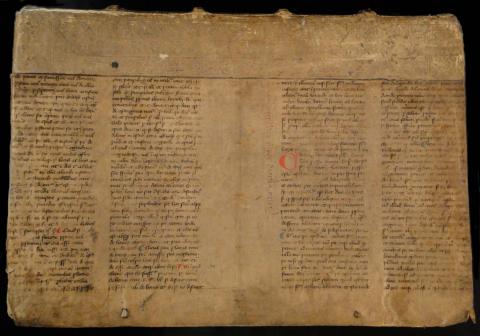Breadcrumb
- Home
- Collection
- Special Collections
- The Leist Collection
The Leist Collection

Title page from Prima super digesto novo. Bartolus, 1541-2.
Title page from Prima super digesto novo. Bartolus, 1541-2.

Close up of manuscript cover. Prima super digesto novo. Bartolus, 1541-2.
Close up of manuscript cover. Prima super digesto novo. Bartolus, 1541-2.
One of the special collections held by the Law Library is the Leist Collection. The Leist Collection was purchased by the Law Library in 1920 and contains more than 3,700 titles. It was assembled by the German legal scholars Burkard Wilhelm Leist (1819 – 1906) and his son, Gerhard Alexander Leist (1862 – 1918).
Burkard Wilhelm Leist was a professor of civil law and taught at the University of Basel in Switzerland and the Universities of Rostock and Jena in Germany. He was a student of Friedrich Carl von Savigny.
Gerhard Alexander Leist was a professor in Roman and German civil law at the University of Giessen in Germany. Like his father, Leist worked in Roman legal history, but his main focus was on the modern practice of law, specifically property and German association law (Vereinsrecht). After Germany’s defeat in the First World War, Leist ended his life by jumping in front of a train. His widow, Dora Leist, sold the collection of books to the Law Library.
The Leist Collection contains a three-volume set of Bartolus which dates from 1541-2. (Bartolus was one of the most prominent jurists of medieval Roman law.) The volumes contain his Prima super digesto novo and Secunda super digesto novo. All three volumes have spines of embossed vellum and are covered with rubricated manuscript leaves.
Most of the books in the Leist Collection are written in German. A small number are in Latin, such as the 1541-2 Bartolus, and a single volume is in English (The motives for, and a new system of, divorce). There are several in French, mostly dictionaries and histories of civilization and Roman law.
The books in the Leist Collection cover a large range of topics, including: torts, slavery (Roman and Greek), servitudes, sales, Roman legal history, books of proverbs in Latin and German, books on language (especially Indo-European, including accents), property law, the law of private companies and corporations, pledges, patriotic societies in Germany/Prussia, obligations, negotiable instruments, mortgages, marriage and rights of women, legal philosophy, numerous periodicals, German legal philosophy and interpretation, German legal history, jurisprudence (German and Roman), several books on anti-Semitism and Jewish legal history, insurance, inheritance and succession (German and Roman), Indo-European law, German history and politics (including the history of the Germanic tribes), German language dictionaries, economics, debtor and creditor law, customary law, criminal law, copyright, contracts, commercial law, and actions and defenses.
Legal education plays an interesting part in the collection. For instance, the collection contains Burkard Wilhelm Leist’s lecture notes on German private law circa 1850. There are books on the study and teaching of Roman law (about 10), as well as on the study and teaching of law in Germany and Prussia (about 14).
There are also a few unusual materials. For instance, there are some books on medical topics, such as heart arrhythmias, the hand, tuberculosis hospitals in Germany, medical jurisprudence, malpractice, liver cirrhosis, immunity, eye inflammation, drug law, corneal diseases, blood analysis, and amnesia. There are two books on vending machines and one on the symbolism of numbers. A book published in 1891 discusses the future of Germany in the year 2000!
To visit the Leist Collection, please contact the Head of Special Collections, Noëlle Sinclair, at noelle-sinclair@uiowa.edu.